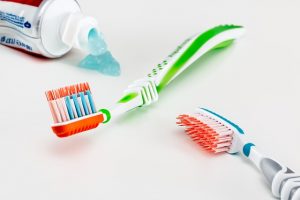
Tooth decay and gum disease are the leading causes of tooth loss. Bacteria in cavities eats enamel, and can cause your gums to become infected. When these problems weaken the tissues that support your teeth, teeth can loosen and fall out.
Preventing Tooth Loss
Brushing and flossing every day, and getting cleanings twice a year, can prevent the plaque build-up that causes cavities and gum disease.
If you notice a problem with your teeth or gums, you should not wait for your next regular dental appointment, but see your dentist right away.
Sometimes people avoid the dentist – even if a tooth hurts – because they’re afraid of pain, or don’t have the money for treatments. But putting off dental care will usually make the problem worse, and you may face tooth loss if you ignore symptoms.
If money is the problem, this website may be able to help you locate a free dental clinic near you.
Diet and Dental Health
Sugary foods and snacks, soda pop, smoking, chewing tobacco, and teeth grinding all can play a role in dental health:
- It is important to brush your teeth after consuming sugary foods or drinks, because sugar can accelerate tooth decay. Soda contains phosphoric acid, which can inhibit calcium absorption. Teenage girls are especially at risk as they accumulate most of their bone mass by age 17 and need calcium to keep their bones and teeth strong.
- Smoking and chewing tobacco can also damage your teeth and gums. For reasons not totally understood, smokers are twice as likely to lose their teeth than nonsmokers.
- Grinding your teeth can make them shorter and more prone to decay.
To protect your teeth, maintain a healthy diet with adequate calcium, protein, and other nutrients. If you are having dental problems, talk to your dentist about how you can change your diet to protect your smile.
SCHEDULE AN ORAL SURGERY APPOINTMENT
Diabetes and Dementia
If you experience tooth loss or decay on a regular basis, it would be a good idea to get tested for diabetes. Here’s how diabetes can exacerbate tooth decay:
Your mouth naturally contains bacteria. When starches and sugars in foods and beverages interact with these bacteria, plaque forms on your teeth. The acids in plaque attack the surfaces of your teeth, which can lead to cavities and gum disease.
The higher your blood sugar level, the greater the supply of sugars and starches — and the more acid wearing away at your teeth.
So finding out if you have diabetes (many people have it and do not know it), and keeping your blood sugar under control, can go a long way toward preventing tooth loss.
Tooth loss has also been linked to dementia in the elderly, so it’s important to get a general checkup if you begin to lose teeth.
Tooth Loss in Children
Most of the time, you should let children’s baby teeth come out naturally, and not try to force them out. It’s OK to wiggle a loose tooth, but pulling teeth before they’re ready to come out can cause the root to break or become stuck in the gums, which can lead to infection or other dental problems.
Once their permanent teeth come in, children usually only lose their teeth when injured (from falls or playing contact sports), or if they have an autoimmune disorder. If your baby or toddler’s permanent teeth are falling out, it could be a sign of a serious disease, so you should see your doctor immediately.
Healthy Teeth, Healthy You
Tooth loss can be either a symptom or a cause of additional health problems, so taking care of your teeth is an important practice for overall health.
